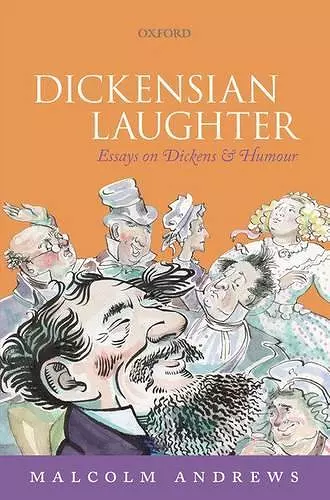Dickensian Laughter
Essays on Dickens and Humour
Format:Hardback
Publisher:Oxford University Press
Published:19th Sep '13
Currently unavailable, and unfortunately no date known when it will be back
This hardback is available in another edition too:
- Paperback£28.49(9780198728047)

How does Dickens make his readers laugh? What is the distinctive character of Dickensian humour? These are the questions explored in this book on a topic that has been strangely neglected in critical studies over the last half century. Dickens's friend and biographer John Forster declared that: 'His leading quality was Humour.' At the end of Dickens's career he was acclaimed as 'the greatest English Humourist since Shakespeare's time.' In 1971 the critic Philip Collins surveyed recent decades of Dickens criticism and asked 'from how many discussions of Dickens in the learned journals would one ever guess that (as Dickens himself thought) humour was his leading quality, his highest faculty?' Forty years later, that rhetorical question has lost none of its force. Why? Perhaps Dickens's genius as a humourist is simply taken for granted, and critics prefer to turn to his other achievements; or perhaps humour is too hard to analyse without spoiling the fun? Whatever the reason, there has been very little by way of sustained critical investigation into what for most people has constituted Dickens's special claim to greatness. This book is framed as a series of essays examining and reflecting on Dickens's techniques for making us laugh. How is it that some written incident, or speech, or narrative 'aside' can fire off the page into the reader's conciousness and jolt him or her into a smile, a giggle, or a hearty laugh? That is the core question here. His first novel, Pickwick Papers, was acclaimed at the time as having 'opened a fresh vein of humour' in English literature: what was the social nature of the humour that established this trademark 'Dickensian' method of making people laugh? And how many kinds of laughter are there in Dickens? What made Dickens himself laugh? Victorian and contemporary theories of laughter can provide useful insights into these processes - incongruity theory or the 'relief' theory of laughter, laughter's contagiousness (laughter as a 'social glue'), the art of comic timing, the neuroscience of laughter. These and other ideas are brought into play in this short book, which considers not only Dickens's novels but also his letters and journalism. And to that end there are copious quotations. The aim of the book is to make readers laugh...
...the study is plentifully illustrated with some of the funniest passages in Dickens's writing-ranging expertly across novels, letters and journalism. Andrews leaves Dickens to tell his own jokes and then calls our attention to what makes them work. It is enjoyable reading ... His [Andrew's] own generous book has an enthusiasm equally infectious. * Daniel Tyler, The Times Literary Supplement *
Malcolm Andrews makes clear his deep knowledge, and also his great enjoyment, of Dickens. What makes this book so readable as well as informative is that his sheer delight in Dickens is infectious. * Paul Schlicke, Dickens Quarterly *
... [a] genial, careful, and interesting study... * Jeremy Tambling, Notes and Queries *
ISBN: 9780199651597
Dimensions: 203mm x 135mm x 22mm
Weight: 322g
208 pages